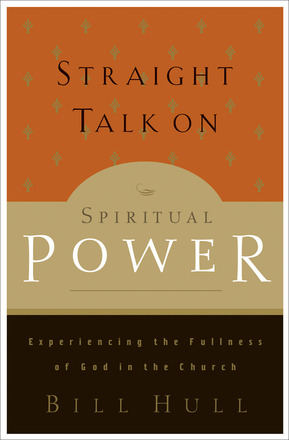Bill Hull: Straight Talk on Spiritual Power, reviewed by Robert Graves
 Bill Hull, Straight Talk on Spiritual Power: Experiencing the Fullness of God in the Church (Grand Rapids: Baker Books, 2002), 255 pages, ISBN 9781441243720.
Bill Hull, Straight Talk on Spiritual Power: Experiencing the Fullness of God in the Church (Grand Rapids: Baker Books, 2002), 255 pages, ISBN 9781441243720.
Although the accuracy of teaching is preeminent when judging the quality of a book, credit must be given for its tone when appropriate. From page one of Hull’s work, the reader is struck with the author’s sincerity, transparency, his passion for people, his drivenness for all that God has for him, and his willingness to risk all for his perception of the will of God in relation to the charismata.
This book comes from the heart of a pastor. More specifically, from the heart of a pastor who is trying to transition parishioners of a cessationist mindset into the fullness of the gifts of the Spirit. There is a generous mix of true-life anecdotes and biblical teaching. Some anecdotes leave you laughing or celebrating, others leave you in tears. At times his language is plain, but poignant: “If you lay your heart on the altar, someone will come and jump up and down on it” (p. 172).
Aside from Hull’s firm belief in the continuation of spiritual gifts in today’s church, even miraculous ones, perhaps his greatest contributions are in the chapters on healing and on hearing God’s voice, in which are packed practical guidelines that encourage faith while acknowledging God’s sovereignty.
It is, however, with reservations that I recommend Straight Talk to Pentecostals. With characteristic frankness, Hull admits that “I have had a prayer language for more than thirty years, but I am still not 100 percent sure it is God or my own flesh” (p. 118). More important, Hull holds an unbiblical view of the baptism of the Holy Spirit, which he views as conversion (p. 116). Although he decries cessationist thinking as “inbred” and based more on “custom” than “study,” he is himself a Lukan cessationist when it comes to the baptism in the Holy Spirit, stating that the Pentecostal interpretation of Spirit-baptism is “impossible” (p. 111).
He bases his interpretation of the six occurrences of Spirit-baptism in Matthew, Mark, and Luke-Acts on the one occurrence in Paul (1 Corinthians 12:13), arguing that Paul’s usage is more weighty because it was seventh and last and twenty years removed from the “fluidity of the first years when they [the first Christians] were all trying to figure out the role of the Holy Spirit” (p. 114). One problem with this is that 1 Corinthians 12:13 appears to be the believer’s baptism by the Holy Spirit into the body of Christ (a sensible and universal experience of all Christians), not the believer’s baptism in the Holy Spirit by the Heavenly Jesus that imparts a prophetic empowerment for service (a likewise sensible though not universal Christian experience; cf. R. Menzies’ Empowered for Witness). Hull shows no appreciation for the diversity of the NT writers and no appreciation for Luke’s uses of “filling” synonyms, which occur over 50 times in Acts alone. Neither does he show any appreciation for the probability that Luke, as a close companion of Paul and as someone who held Paul in high regard as a great man of God, is applying his considerable training in the Greco-Roman narrative style of historiography to clarify Paul’s epistolary writings for Christians thirty years removed from Paul. Instead, Lukan cessationist like Hull have effectively silenced Luke’s majority usage of “baptized” (3x) and “filled” (9x) in favor of Paul’s single usage of each term (1x[?]/1x). This use of Paul to parse Luke is a practice left over from cessationist Protestantism, and a hearty adieu by biblical exegetes is long overdue. (For more thorough discussion, see Roger Stronstad’s Spirit, Scripture and Theology: A Pentecostal Perspective and The Charismatic Theology of St. Luke).
Category: Spirit


